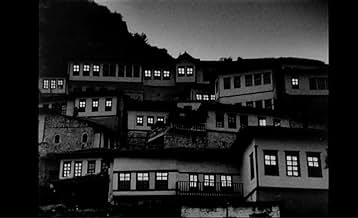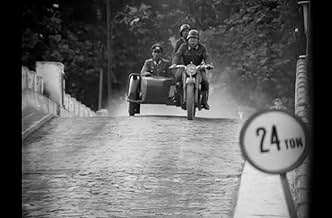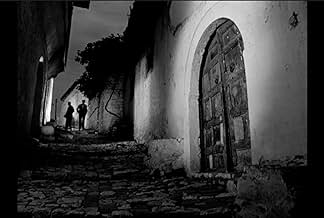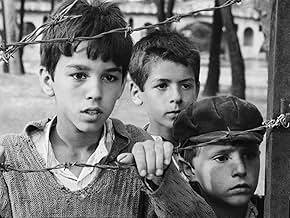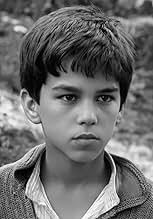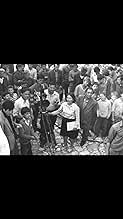Ajouter une intrigue dans votre langueThe Wehrmacht arrives in a small Albanian town after Italy capitulates to the Allies. Tomka and his gang decide to exact revenge when the German soldiers set up camp on their football pitch.The Wehrmacht arrives in a small Albanian town after Italy capitulates to the Allies. Tomka and his gang decide to exact revenge when the German soldiers set up camp on their football pitch.The Wehrmacht arrives in a small Albanian town after Italy capitulates to the Allies. Tomka and his gang decide to exact revenge when the German soldiers set up camp on their football pitch.
Avis en vedette
I am so grateful to the Turner Classic Movies (TCM) channel for showing this rarely seen 1977 masterwork on October 20, 2020 as part of its presentation of Mark Cousins' documentary series Women in Film: A New Road Movie through Cinema.
Wondrous performances from the children especially. The framing, the mise-en-scène, are astonishing. And a small dog also has a role which might have earned a "palm dog" if this had been a selection of the Cannes film festival. (There's also a large black guard dog. Even a goat gets in on the act.) At the time of production Albania was a closed society and nowhere on the world cinema map. So all the more remarkable.
This marvelous film about a group of children in the town of Berat, Albania was virtually unknown outside of its country of original until fairly recently. Its appearance on TCM should make it familiar to many more. From the end of World War II until the 1990s Albania was a closed society, one of the most restrictive Communist nations on the planet, rivaling that of North Korea. (I recommend seeing Gianni Amelio's 1996 film "Lamerica" which dealt with the nation's collapse and the outflow of refugees resulting from its turmoil.) The children here have an ongoing feud with the occupying German soldiers who have taken over their playground. They develop some patriotic consciousness and assist the local partisans in combatting the intruders, in a way we also saw in Rossellini's classic "Open City." The boys (and the occasional young girl) are all fine troupers as is their mascot dog Tuli and a little goat, and the adults as well. The woman director Xhanfize Keko was remarkably skilled in eliciting natural performances from the young cast and apparently made a number of other films with a youthful roster. The opening shot with the group of kids cheerfully walking together, and accompanied by lilting background music, sets the tone for this very nice movie.
It's a small village in Albania in 1943. The Italians have been scattered by the Resistance, and 6,000 German troops have moved in (in the entire nation, not the village) and have taken the field on which Sotiraq Çili, his friends, his dog, and a goat play football. The non-denominational partisans want to protect the boys, but they need information on the fascists; since the boys have been playing football in the road by the field, they can observe and report without raising suspicion.
It's a well made film, and the kids act like kids, not really understanding the situation or the stakes involved, but loyal Albanians to a fault. Xhanfize Keko had spent most of her earlier career directing documentaries. By the time her directing career was done in 1985, she had directed 21 movies, ten of them story films She died in 2007, aged 79.
It's a well made film, and the kids act like kids, not really understanding the situation or the stakes involved, but loyal Albanians to a fault. Xhanfize Keko had spent most of her earlier career directing documentaries. By the time her directing career was done in 1985, she had directed 21 movies, ten of them story films She died in 2007, aged 79.
I missed this film when it was shown as part of Mark Cousins' The Cinema of Childhood. Now five years later, I finally got to see it. It did not disappoint.
A group of children in German occupied Albania fight back against their oppressors by helping the partisan resistance. That's the plot, but the film is also about the friendship and camaraderie both among the children and the people of the town. But there's also a joy and dare I say it fun to the picture as well. The film is shot always from the child's perspective. As such it is entirely believable.
Hugely enjoyable, nothing intrinsically nasty (we're talking Nazis here but there's no violence seen on screen) and the sort of film children the same age as the protagonists should enjoy immensely.
Despite the fact that many people in my country (Turkey), including myself, have relatives who have married people of Albanian origin, that Albania is not very far from my country, and that there are many common words between Albanian and Turkish, I should be inclined towards Albanian art and literature, but I have no idea about it... The internet and technology should be removing borders and bringing us closer together, but it has made us all Anglo-Saxon. This is very sad.
Abbas Kiarostami is as important to Iranian cinema as Xhanfise Keko is to Albanian cinema. Of course, Keko comes before Kiarostami because of her age.
The film, an elegy dedicated to the resistance of communist partisans against fascists and Nazis in World War II, was produced by the "Shqipëria e Re" film studio and is a very important film in Albania. Xhanfise Keko, the country's only female director, often referred to as "Aunt Keko", has produced a number of youth films that are very popular in Albania. After Tomka, Keko made two more films centered on children: Pas gjurmëve (1978) and Partizani i vogël Velo (1980). She later worked with Enea Zhegu, who passed away two years ago.
The music, composed by Aleksandër Lalo, was played by the Radio Televizioni Shqiptar Symphony Orchestra under the direction of Ferdinand Deda, and in two scenes the children sing these songs, which were quite impressive scenes anyway.
Long story short; there are cinemas other than EU and US cinemas, and they contain magnificent treasures like this film.
By the way; I am sad to say that the version of the film that was restored in the US in 2012 and is available on YouTube is 7 minutes short...
Abbas Kiarostami is as important to Iranian cinema as Xhanfise Keko is to Albanian cinema. Of course, Keko comes before Kiarostami because of her age.
The film, an elegy dedicated to the resistance of communist partisans against fascists and Nazis in World War II, was produced by the "Shqipëria e Re" film studio and is a very important film in Albania. Xhanfise Keko, the country's only female director, often referred to as "Aunt Keko", has produced a number of youth films that are very popular in Albania. After Tomka, Keko made two more films centered on children: Pas gjurmëve (1978) and Partizani i vogël Velo (1980). She later worked with Enea Zhegu, who passed away two years ago.
The music, composed by Aleksandër Lalo, was played by the Radio Televizioni Shqiptar Symphony Orchestra under the direction of Ferdinand Deda, and in two scenes the children sing these songs, which were quite impressive scenes anyway.
Long story short; there are cinemas other than EU and US cinemas, and they contain magnificent treasures like this film.
By the way; I am sad to say that the version of the film that was restored in the US in 2012 and is available on YouTube is 7 minutes short...
Le saviez-vous
- AnecdotesWhen the boys taunt the two "Ballis" on the steps in the town, they are heckling members of The Balli Kombelar, also known as The National Front. These were Albanians who sided with the Germans during the occupation of Albania during World War II.
- ConnexionsFeatured in A Story of Children and Film (2013)
Meilleurs choix
Connectez-vous pour évaluer et surveiller les recommandations personnalisées
Détails
- Durée1 heure 14 minutes
- Couleur
- Mixage
Contribuer à cette page
Suggérer une modification ou ajouter du contenu manquant

Lacune principale
By what name was Tomka dhe shokët e tij (1977) officially released in India in English?
Répondre
